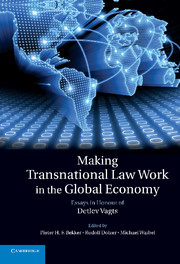Book contents
- Frontmatter
- Contents
- List of contributors
- Foreword: the transnationalism of Detlev Vagts
- List of cases cited
- List of abbreviations and acronyms
- Introduction: a Festschrift to celebrate Detlev Vagts' contributions to transnational law
- 1 Detlev Vagts and the Harvard Law School
- 2 Constructing and developing transnational law: the contribution of Detlev Vagts
- I International law in general
- II Transnational economic law
- III Transnational lawyering and dispute resolution
- 23 Diffusion of law: the International Court of Justice as a court of transnational justice
- 24 Regulating counsel conduct before international arbitral tribunals
- 25 International arbitrators as equity judges
- 26 Customary international law, Congress and the courts: origins of the later-in-time rule
- 27 Mediation and civil justice: a public–private partnership?
- 28 The borders of bias: rectitude in international arbitration
- 29 Managing conflicts between rulings of the World Trade Organization and regional trade tribunals: reflections on the Brazil – Tyres case
- 30 Cross-border bankruptcy as a model for the regulation of international attorneys
- Bibliography of Detlev Vagts
- Index
29 - Managing conflicts between rulings of the World Trade Organization and regional trade tribunals: reflections on the Brazil – Tyres case
from III - Transnational lawyering and dispute resolution
Published online by Cambridge University Press: 17 November 2010
- Frontmatter
- Contents
- List of contributors
- Foreword: the transnationalism of Detlev Vagts
- List of cases cited
- List of abbreviations and acronyms
- Introduction: a Festschrift to celebrate Detlev Vagts' contributions to transnational law
- 1 Detlev Vagts and the Harvard Law School
- 2 Constructing and developing transnational law: the contribution of Detlev Vagts
- I International law in general
- II Transnational economic law
- III Transnational lawyering and dispute resolution
- 23 Diffusion of law: the International Court of Justice as a court of transnational justice
- 24 Regulating counsel conduct before international arbitral tribunals
- 25 International arbitrators as equity judges
- 26 Customary international law, Congress and the courts: origins of the later-in-time rule
- 27 Mediation and civil justice: a public–private partnership?
- 28 The borders of bias: rectitude in international arbitration
- 29 Managing conflicts between rulings of the World Trade Organization and regional trade tribunals: reflections on the Brazil – Tyres case
- 30 Cross-border bankruptcy as a model for the regulation of international attorneys
- Bibliography of Detlev Vagts
- Index
Summary
Introduction
The proliferation of international tribunals in recent decades has given rise to much concern about potential conflicts between judicial decisions and possible ‘fragmentation’ of international law. Most of the discussions have focused on conflicts of jurisdictions and conflicts of norms that may result from competing or overlapping jurisdictions. While some commentators believe that judicial competition can have a positive effect on the development of international law, others worry that different judicial interpretations may create inconsistent rights and obligations for the States. The worst type of conflicts, however, is the conflict of obligations where a State cannot comply with the decisions of two tribunals at once because their separate decisions require the State to act in entirely opposite directions.
Unfortunately, such a direct conflict of obligations has occurred, for the first time to the author's knowledge, as a result of the decision of the World Trade Organization (WTO) in the Brazil – Tyres case. The WTO Appellate Body held in this case that, by following the ruling of an Arbitral Tribunal of Mercosur – the regional trade agreement (RTA) between Brazil and several South American countries – Brazil had acted inconsistently with WTO rules. Consequently, Brazil found itself in a legal bind in which it could not comply with its WTO obligations without breaching its obligations under Mercosur. Although as a regional free trade agreement (FTA) Mercosur needs to meet certain WTO requirements – in particular Art.
- Type
- Chapter
- Information
- Making Transnational Law Work in the Global EconomyEssays in Honour of Detlev Vagts, pp. 601 - 629Publisher: Cambridge University PressPrint publication year: 2010
- 1
- Cited by



